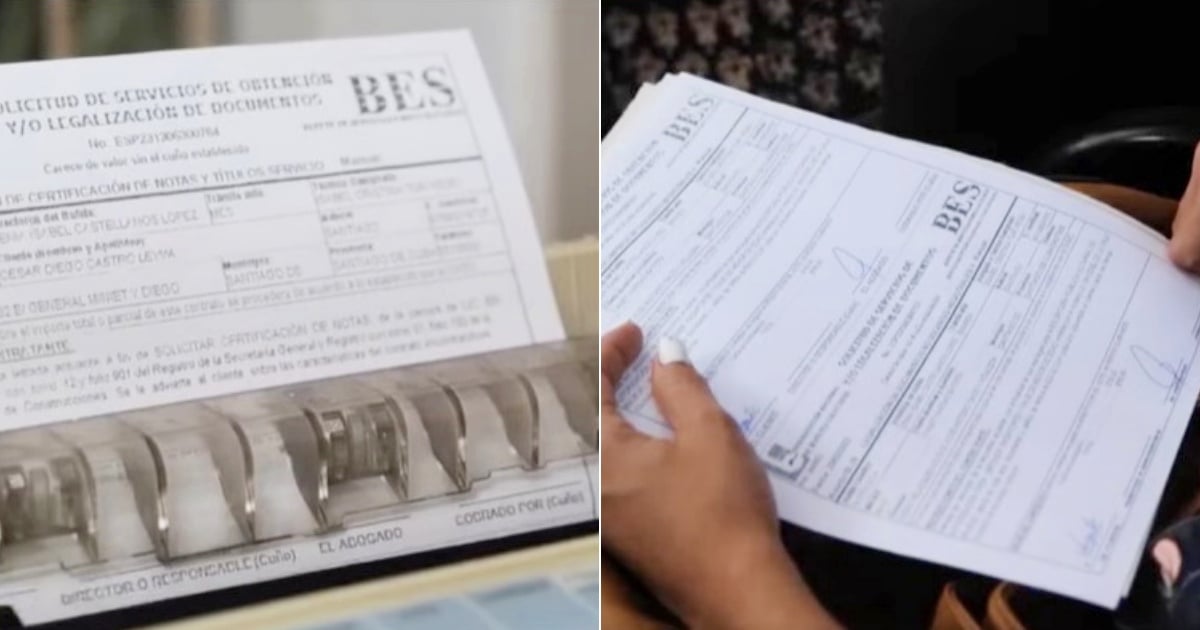Starting Monday, February 3, the Ministry of Foreign Affairs (MINREX) in Cuba ceased its service of document legalization, both for international and domestic use. This responsibility has now been transferred to the Ministry of Justice (MINJUS) with the intention of streamlining the process.
"This transition aims to consolidate all phases of the document legalization process, which occurs across registration entities, law firms, and consultancies. A new legalization unit is being established within the Ministry of Justice to fulfill this purpose," stated MINREX in an official release. The ministry assured that, in coordination with the Ministry of Justice and the International Legal Services Group "Servicios Legales S.A", all necessary steps have been taken to ensure uninterrupted service continuity, maintaining the quality and efficiency required by the populace.
Ana Teresita González, the Director General of Consular Affairs and Cuban Residents Abroad, mentioned on X that over 1.5 million documents were legalized in 2024. She emphasized that "since May 2024, there have been no delays at MINREX in services provided to accredited entities," highlighting that the recent transfer aims to further enhance this activity.
How Will the New System Operate?
Moving forward, individuals seeking document legalization must approach collective law firms, which will manage the process with MINJUS. Nevertheless, the procedure will continue to pass through existing channels, including the International Legal Firm and MINREX stamps. Documents already bearing MINREX seals will remain valid, eliminating the need for re-legalization.
Costs and Payment Methods
The fees for legalization services remain unchanged, as outlined in the Extraordinary Official Gazette No. 23 of March 30, 2022:
- Birth, marriage, and death certificates: 400 CUP.
- Criminal record certificates, wills, and inheritance declarations: 1,250 CUP.
- Legal capacity certifications: 2,500 CUP.
- Divorce decree certifications: 3,750 CUP.
For document legalization, the costs are:
- Registration and notarial documents for individuals: 375 CUP per document.
- Educational documents in central organizations: 2,500 CUP per document.
Payments can be made using stamped seals, which have been scarce in physical form but are accessible digitally via Transfermóvil and Enzona.
Concerns and Criticisms Regarding the Transition
The government claims the change will not lead to additional complications or delays in processing. However, the new system's effectiveness will largely depend on its ability to handle the high demand for document legalizations in Cuba. Some citizens remain skeptical about the restructuring, hoping that "everything will be well-computerized."
"I don’t think it’s for the better; I haven’t seen any noticeable improvements yet. But well, we have to wait and see how it goes. Hopefully, it will get better," stated a user on social media. In April of the previous year, MINREX acknowledged a backlog in document legalization due to an increase in demand for this service.
Ernesto Soberón, who previously served as the General Director of Consular Affairs and Cuban Residents Abroad (DACCRE), explained that compared to the previous year, there was a 16% increase in demand. Faced with the growing volume of requests, the Cuban government has been considering joining the Apostille Convention. This international agreement would simplify the validation of documents for foreign use, eliminating the need for additional legalizations in up to 60% of cases.
Although this option is under review, it could provide a significant solution to expedite the legalization process.
Understanding Document Legalization in Cuba
Why did the responsibility for document legalization transfer to the Ministry of Justice?
The transfer aims to streamline the document legalization process by consolidating it within the Ministry of Justice, which will handle all phases of the procedure.
Are there any changes to the fees for document legalization in Cuba?
No, the fees for document legalization services remain the same as previously established, with no increase expected at this time.
How can payments for document legalization be made?
Payments can be made using stamped seals, available digitally through platforms like Transfermóvil and Enzona.
What potential solution is the Cuban government considering for streamlining document legalization?
The government is contemplating joining the Apostille Convention, which would simplify the validation of documents for international use by removing the need for additional legalizations in many cases.
